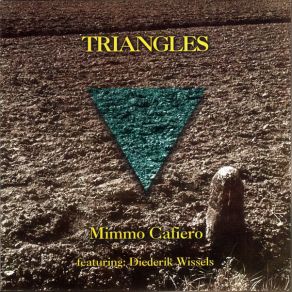Triangles
Download links and information about Triangles by Mimmo Cafiero. This album was released in 1997 and it belongs to Jazz genres. It contains 11 tracks with total duration of 52:30 minutes.

|
|
|---|---|
| Artist: | Mimmo Cafiero |
| Release date: | 1997 |
| Genre: | Jazz |
| Tracks: | 11 |
| Duration: | 52:30 |
| Buy it NOW at: | |
| Buy on iTunes $9.99 | |
Tracks
[Edit]| No. | Title | Length |
|---|---|---|
| 1. | Ciccio | 4:10 |
| 2. | Hal | 6:42 |
| 3. | Triangles | 4:45 |
| 4. | Thanks | 4:28 |
| 5. | Forse Si Canta... | 6:03 |
| 6. | Pippo | 4:34 |
| 7. | Più O Meno | 5:10 |
| 8. | Cip & Ciop | 2:53 |
| 9. | Pullman | 9:19 |
| 10. | Blob | 3:17 |
| 11. | Canzona Zigana | 1:09 |
Details
[Edit]Though he's well known among fellow Italian musicians as a composer of merit and a drummer of distinction, Mimmo Cafiero usually takes a back seat to other players as a leader — even when composes the lion's share of a recording. Here, with a band of his own choosing, Cafiero is allowed to shine in the leader's chair as well. Backed by saxophonist Stephano D'Anna, guitarist Pietro Condorellli, pianist Diederik Wissels, and Dario Deidda on electric bass, Cafiero composed the entire program and charted all the arrangements. The set opens with a startling track — for Americanskis anyway. "Ciccio"'s melody line is a dead halfway point between the theme from the Flintsones TV show and Weather Report's "Birdland." It's an ostinato largely, and never evolves into much of an improvisation, but it allows the band to loosen up and spring forth with force out of the gate — besides, once you hear it, you'll be humming it for days. From here, things get more ambitious and more languid in "Hal," an impressionistic piece written for Wissels, whose Bill Evans-influenced opening solo is as seductive as anything you might find in the Quartet West fake book. When D'Anna enters with his lilting line and Deidda underscores it with a swinging, gentle, slightly funky bassline, the tune becomes more than circumspect it becomes a cipher. As the tempo and dynamic increases, the flow through the middle by the rhythm section does to. D'Anna hold sway across the top but Cafiero's accents and well-placed rim shots set it off kilter just enough for Wissell's fills to be necessary not just complementary. "Pullman," near the end of the album, is a nine-minute opus is the most adventurous thing here. As slow, almost thematic melody asserts itself against an abstract percussive backdrop, D'Anna is involved in a blissed-out arpeggio meditation until about the four-minute mark when the entire back kicks into off minor mode and Deidda's bass augmented by hand percussion and a the kit by Cafiero turn the track into an Eastern-tinged piece of complex modal exotica without losing the intricate melodic sensibility built into the piece.